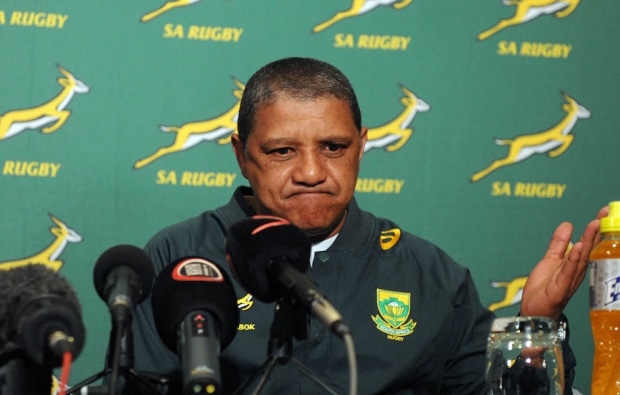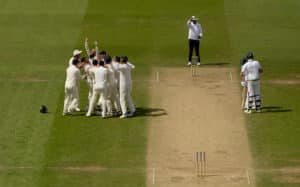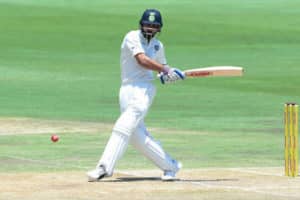Recent results and performances have highlighted the poor planning and tactical shortcomings of the Springbok coaching team, writes JON CARDINELLI.
The All Blacks went into the clash against the Boks two weeks ago without senior players of the calibre of Ben Smith, Owen Franks, Joe Moody and Israel Dagg. Six of the 15 players who started that Test had fewer than 20 Test caps. The All Blacks still scored eight tries and handed the Boks their heaviest Test defeat in history.
More recently, the All Blacks travelled to Argentina without the aforementioned players as well as Sam Whitelock, Brodie Retallick, Sam Cane and Liam Squire. The All Blacks – fielding nine players in the starting XV with fewer than 20 caps – ran in five tries and claimed a 26-point win.
Consider what the All Blacks could accomplish in any one-off match between now and the 2019 World Cup final if they had all of their best players fit and available. Consider how strong they could be in terms of player depth by the time that global tournament comes to pass.
The All Blacks in their current guise are the product of careful planning. All five of the New Zealand franchises work together to ensure that the national side is as strong as it can possibly be. On top of that, a crack team of coaches is constantly searching for new ways to boost the levels of performance.
The former has proved instrumental to New Zealand’s sustained success. The influence of Hansen and the other All Blacks coaches, of course, cannot be discounted.
I disagree with those who say that we shouldn’t put Hansen’s All Blacks on a pedestal. After all, how do you argue with a 90% win-record across a period of 77 Tests?
At the same time, I disagree with those who argue that an international side has to play like the All Blacks to beat the All Blacks. Indeed, there’s a reason why teams like the Boks and Wallabies are considered part of the chasing pack while others like England and Ireland are seen as genuine threats to the All Blacks’ dominance.
The Boks, as well as the less successful South African Super Rugby sides, have attempted to copy the New Zealand brand of rugby in recent years instead of building on their traditional strengths and establishing their own identity. If they continue on their current course, they will continue to chase and chase without getting any closer to the goal of matching the New Zealanders’ offloading game and remarkable fitness levels.
Allister Coetzee’s Boks were praised in the wake of their convincing wins against Argentina in August. A couple of months on, and those performances are being viewed in a new light.
The Pumas have lost all five games to date and have conceded nearly 200 points. Meanwhile, the Boks have scored just five tries across the three Tests against Australia and New Zealand.
In the wake of the recent result in Bloemfontein, Coetzee attempted to talk up the Wallabies as if they were a world-beating side. This is the same Wallabies side that lost to Scotland at home earlier this year and the same side that was pushed close by Italy. The Boks have failed to beat the same mediocre Wallabies side on two occasions in the Rugby Championship.
That the South African structures are backward and in dire need of fixing is not up for debate. That said, the current Bok coaching team has to take some responsibility for the team’s results and performances over the past two seasons.
REVIEW: Boks, Aus vie for second spot
The Boks disappointed with their frantic attacking approach in Perth. The compulsion to offload was almost as frustrating to watch as Coetzee’s post-match assurances that his team would have scored if those speculative passes had stuck.
The Wallabies came into the match in Bloemfontein knowing that the Boks would attempt to run and offload regardless of what transpired at the gainline. In an attempt to lift the tempo, the Boks lost the ball in contact or proceeded to hand the opposition an easy intercept.
The Wallabies clearly don’t have what it takes to punish the Boks to a more telling degree. The All Blacks, however, have already inflicted one 50-point hammering on the Boks in 2017. A second heavy defeat may be in the offing if the Boks persist with these flawed tactics and don’t address their defensive shortcomings.
We can expect a series of excuses pre-empting a loss at Newlands: The Boks have lost a host of first-choice players to injuries and are thin in positions like loose forward and tighthead prop; South Africa doesn’t boast the same structures as New Zealand and are thus limited in what they can build and achieve at Test level.
Coetzee intimated at the post-match press conference in Bloemfontein that the Boks would do well to avoid another hiding at the hands of the All Blacks.
What Coetzee and company fail to acknowledge, though, is the role they have played in South African rugby’s sharp decline. The Boks will play into the All Blacks’ hands next Saturday – and indeed in all matches that follow in the lead-up to the 2019 World Cup – if they attempt to beat the New Zealanders at their own game.
Ten years ago, Bok coach Jake White formulated a game plan based on South African rugby’s physical strengths. The Boks went on to win the 2007 World Cup via a simple yet effective approach. Who knows how far the Boks may have progressed if they had built on those structures in the years that followed?
More recently, Eddie Jones’ move to steer England back to a more physical approach has resulted in two Six Nations titles. Jones’ England are currently at No 2 in the World Rugby rankings.
We can expect a clash of styles when England meet New Zealand in 2018. If the recent British & Irish Lions series is any indicator, we can expect a closely contested match.
Coetzee’s Boks are still caught between two styles and are still searching for an identity. Until a new coaching staff is installed or – more realistically – until Rassie Erasmus returns to South Africa in early 2018 and provides the team with more tactical direction, the Boks will continue to chase shadows.
Photo: Sydney Mahlangu/BackpagePix





